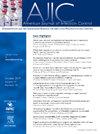入院快速抗原检测(RATs)对从急症医院转入康复后环境的患者进行 COVID-19 检测的作用。
IF 3.8
3区 医学
Q2 INFECTIOUS DISEASES
引用次数: 0
摘要
背景:快速抗原检测(RAT)适用于医疗点检测,无需实验室时间,并能立即得到结果。然而,在医疗机构中,与聚合酶链反应(PCR)检测相比,快速抗原检测对检测无症状的 COVID-19 感染是否有用?目的:本研究的目的是利用快速抗原检测实施可靠的检测系统,以便在从急诊医院转入急性期后康复病房(PARU)的主要无症状患者中快速检测 COVID-19 感染:方法:对入院后三个月内没有确诊Covid-19感染病史的所有新入院患者进行RAT检测。对所有 RAT 检测呈阳性的患者进行 PCR 检测,以进行确认。研究了 PCR 检测结果中 COVID-19 的周期阈值(Ct),以确定 RATs 的效用:2023年1月至12月,共有1403名患者转入PARU。研究结果显示,RATs 的准确率为 85%,入院时的假阴性结果率为 15%。所有在入院时RAT呈阳性的患者的PCR检测结果也都呈阳性:这种检测算法可及早发现并及时隔离阳性病例,从而减少 COVID-19 感染的传播、医院疫情爆发和病床/病房关闭的可能性。本文章由计算机程序翻译,如有差异,请以英文原文为准。
Role of admission rapid antigen testing (RATs) for COVID-19 on patients transferred from acute hospitals to a postacute rehabilitation setting
Background
Rapid antigen tests (RATs) are suitable for point-of-care testing, require no laboratory time, and give immediate results. However, are RATs useful for detecting asymptomatic COVID-19 infection when compared with polymerase chain reaction (PCR) testing in health care settings?
Methods
RAT testing was carried out on all new admissions without a history of confirmed COVID-19 infection within 3 months of admission. PCR testing was carried out on all patients with a positive RAT for confirmation purposes. The cycle threshold values of COVID-19-detected results on PCR testing were examined to determine the utility of the RATs.
Results
A total of 1,403 patients were transferred to the postacute rehabilitation unit from January to December 2023. The results of the study revealed an 85% accuracy of RATs with a 15% rate of false-negative results at the time of admission. All patients who had a positive RAT at the time of admission also had a positive PCR test.
Conclusions
This testing algorithm resulted in early detection and prompt isolation of positive cases reducing the likely spread of COVID-19 infection, hospital outbreaks, and bed/ward closures.
求助全文
通过发布文献求助,成功后即可免费获取论文全文。
去求助
来源期刊
CiteScore
7.40
自引率
4.10%
发文量
479
审稿时长
24 days
期刊介绍:
AJIC covers key topics and issues in infection control and epidemiology. Infection control professionals, including physicians, nurses, and epidemiologists, rely on AJIC for peer-reviewed articles covering clinical topics as well as original research. As the official publication of the Association for Professionals in Infection Control and Epidemiology (APIC)

 求助内容:
求助内容: 应助结果提醒方式:
应助结果提醒方式:


